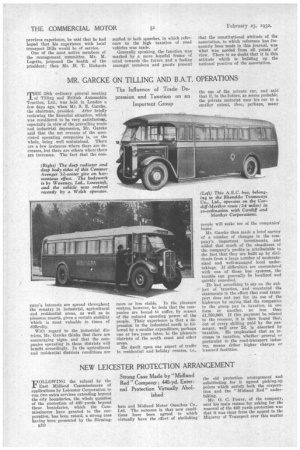MR. GARCKE ON TILLING AND B.A.T. OPERATIONS
Page 44

If you've noticed an error in this article please click here to report it so we can fix it.
The Influence of Trade Depression and Taxation on an Important Group THE 28th ordinary general meeting of Tilling and British Automobile Traction, Ltd., was held in London a few days ago, when Mr. S. E. Garcke,
the chairman, presided. After briefly reviewing the financial situation, which was considered to be very satisfactoary, especially in view of the prevailing trade and industrial depression, Mr. Garcke said that the net revenue of the associated operating companies is, on the whole, being well maintained. There are a few instances where there are decreases, but there are others where there are increases. The fact that the corn pang's interests are spread throughout the country in industrial, agricultural and residential areas, as well as in pleasure resorts, gives a certain stability which is most valuable in times of difficulty.
With regard to the industrial districts, Mr. Garcke thinks that there are encouraging signs, and that the companies operating in those districts will benefit accordingly. In the agricultural and residential districts conditions are more or less stable. In the pleasure centres, however, he feels that the companies are bound to suffer, by reason of the reduced spending power of the people. Their experience is that a depression in the industrial north is followed by a smaller expenditure, perhaps one or two years later, in the pleasure districts of the south coast and other areas.
He dwelt upon one aspect of traffic in residential and holiday centres, i.e., the use of the private car, and said that if, in the future, as seems probable, the private motorist uses his car to a smaller extent, then, perhaps, many people will make use of the companies' buses.
Mr. Garcke then made a brief survey of a number of changes in the company's important investments, and added that much of the steadiness of the company's profits is attributable to the fact that they are built up by dividends from a large number of moderatesized and well-managed local undertakings. If difficulties are encountered with one of those bus systems, the trouble can generally he localized and quickly remedied.
He had something to say on the subject of 'taxation, and countered the statements to the effect that road transport does not pay for its use of the highways by saying that the companies in the group pay in taxation, in one form or another, no less than £1,750,000. If this payment be related to the revenue, it is then found that, out of every shilling paid by the passenger, well over 211. is absorbed by taxation. He emphasized that an increase in taxation, whether general or particular to the road-transport industry, means 4ither higher charges or lessened facilities.




































































































